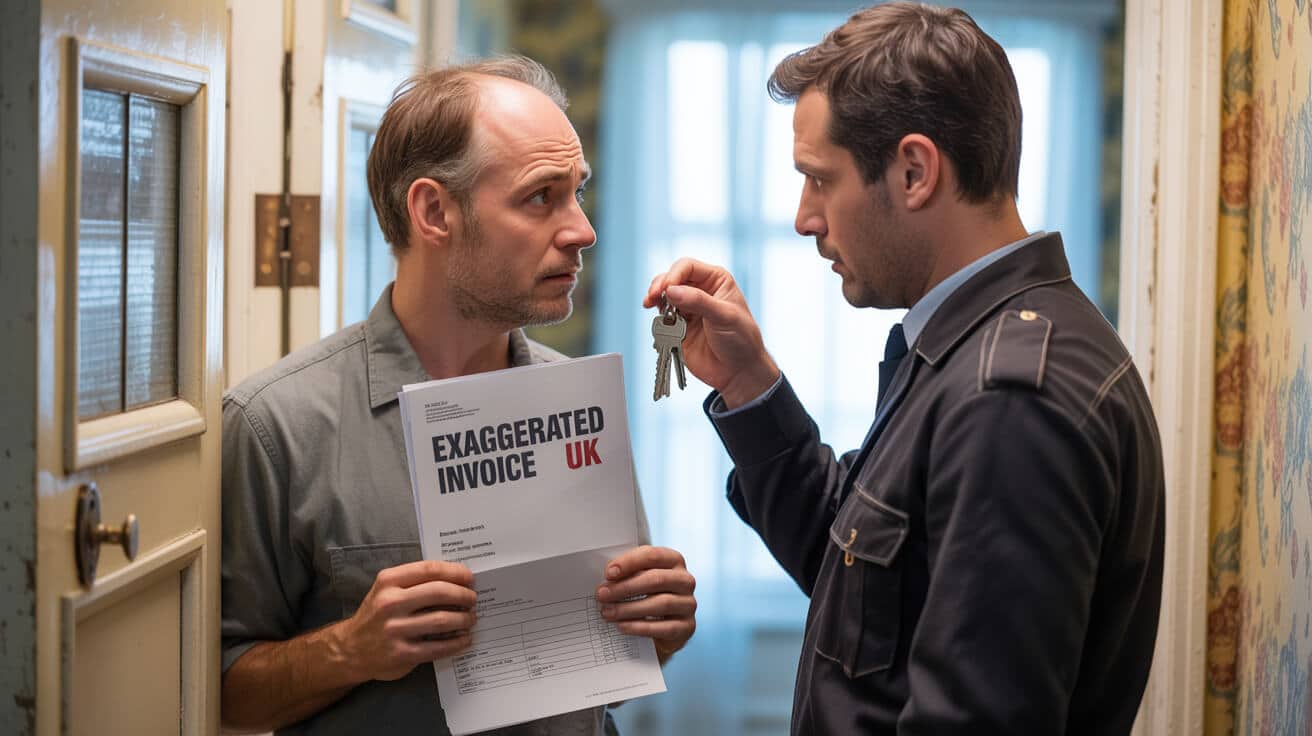 Can A Tenant Withhold Rent For Unresolved Maintenance Issues In The Uk
Can A Tenant Withhold Rent For Unresolved Maintenance Issues In The Uk

Can a Tenant Withhold Rent for Unresolved Maintenance Issues in the UK? Here’s What Actually Happens
Stepping into rented property, you assume the basics are handled — heating, leaks, safe electrics. But what if your landlord goes silent when repairs matter most? You might feel the urge to withhold rent as leverage, especially when weeks pass with no sign of a fix. But in the UK, holding back rent rarely ends well for tenants: you risk your home, your deposit, and your legal position — even when the fault is clear.
You protect your home best with paperwork and persistence — not with withheld rent.
Contrary to loud online forums or well-meaning friends, skipping a payment usually weakens your case, not the landlord’s. UK law ties maintenance responsibilities strictly to landlords, but the act of paying rent runs on its own track. Let’s break down exactly how the rules, the process, and the battlefield of evidence really work, so you avoid traps and get repair results — without putting your tenancy on the line.
What Are Your Legal Rights (and Limits) When Repairs Are Delayed?

Most tenants are covered by the Landlord & Tenant Act 1985 and the Homes (Fitness for Human Habitation) Act 2018, which require landlords to:
- Keep a property’s structure and exterior in solid repair (walls, windows, roof, doors).
- Maintain working installations for heating, hot and cold water, gas, electricity, and sanitation.
- Fix hazards and defects that make a property “unfit” — like serious damp, unsafe wiring, or faulty boilers ((Gov.uk, 2023)).
But the critical boundary never shifts: Rent must be paid in full, on schedule, regardless of ongoing repair disputes. Legally, these two issues run in parallel — one does not excuse the other. If you hold back payment, you’re seen as breaching your agreement. This gives landlords a shortcut to eviction via Section 8 or Section 21 notices, even when repair neglect is obvious.
Landlords have eviction tools for non-payment. Tenants have power only when they build an evidence trail.
Skip the process, withhold rent, and the eviction machinery starts rolling. Stick to proper escalation — documenting every contact, confirming faults in writing, escalating at the right moment — and you put the odds back in your favour, regardless of how stubborn a landlord becomes.
UK Maintenance Law: The Actual Sequence of Rights
- Section 11, Landlord & Tenant Act 1985: Demands repair of structure and essential services.
- Homes (Fitness for Human Habitation) Act 2018: Extends standards to safety, heating, and major defects.
- Rent Payment Law: Your rent contractually must be honoured; withholding without a formal process almost always tips the legal balance in the landlord’s favour.
Why Withholding Rent Almost Always Backfires (and Can Escalate Quickly)

Withholding rent feels like natural self-defence when you’re ignored — but it’s a trap. In the real world, UK courts see withheld rent as a straightforward breach, not a justified protest. Here’s what can unravel:
- Your landlord can start Section 8 eviction action after just two months’ missed rent.
- Most tenancy deposit schemes automatically clear rent arrears first, meaning repair costs or reimbursement claims come second.
- Unpaid rent gets flagged to tenant referencing agencies, making future moves harder.
- Even if you eventually “win” the repair battle, you could lose your home and your deposit in the meantime — with court costs stacking up.
The law does not allow self-help withholding. Only documented, procedurally sound escalation offers protection.
What Actually Moves the Needle?
Resolve disputes using evidence, not emotion. Your written records, not your anger, form the backbone of any successful complaint. Phone calls or WhatsApp messages don’t stack up — only dated, written logs and escalation steps count.
- No evidence: You’re at the landlord’s mercy; even deposit return becomes risky.
- Skimping on council escalation: Opens you up to “no fault” eviction that council action could have blocked ((Shelter UK, 2024)).
- Retaliating without documentation: Turns a strong moral case into a weak legal one.
How Should You Push for Repairs Without Jeopardising Your Tenancy?

Getting a repair sorted without risking your tenancy means following a playbook that’s clear, repeatable, and rooted in British tenancy law. Here’s the approach that keeps you protected while putting effective pressure on your landlord.
1. Log the Fault in Writing
- Fault description, location, and discovery date.
- Photos or brief videos if possible.
- Timeline expectations: 24–48 hours for urgent (heating, leaks), up to 14 days for non-urgent.
Keep all correspondence; request receipts or use recorded delivery.
2. Maintain a Repair Log
- Note every follow-up. Eg: “Emailed agent 9 May, chased 11 May, no response.”
- Add photos if damage worsens.
3. Notify the Council for Major or Health-Threatening Issues
- Environmental Health teams can inspect, issue Improvement Notices, and even pause “no fault” eviction attempts.
- Compile a summary: original complaint, all follow-ups, and visual evidence.
4. Gather Professional Evidence
- Call in a regulated technician (for example, All Services 4U) for neutral inspection or emergency repairs.
- Use their reports and invoices to anchor your evidence; these carry weight with councils, agents, and in court.
5. Never Stop Paying Rent
- Stay calm. No threats, no emotional appeals, no self-authorised “rent holidays.”
- Factual, patient, professional steps preserve your rights and protect your tenancy.
Every written step you take moves you closer to a safe, well-maintained home.
Can You Ever “Repair and Deduct” from Rent Legally in the UK?

“Repair and deduct” is possible, but it’s a risky last resort that only works after ticking every legal box. Courts and councils expect to see an ironclad evidence trail before you even consider deducting costs from rent.
The Real Process (Not a Shortcut):
- Notify Your Landlord in Writing about the repair, give a firm deadline.
- Warn Them in writing: non-action will lead you to arrange the repair yourself and deduct costs from rent.
- Obtain Three Quotes from certified, insured contractors (such as All Services 4U).
- Share Quotes and Timeline with your landlord — allow a reasonable response window.
- Proceed with Minimum Work only if landlord fails to act; keep the repair essential and proportional.
- Compile Your Proof: save all invoices, before-and-after photos, and communication threads.
- Request Reimbursement from the landlord; formally explain the deduction if absolutely necessary.
If any step is skipped, your landlord can dispute the expense, keep your deposit, or even threaten eviction — and many deposit protection schemes will side with your landlord on a technicality.
The burden of proof is on you — if you skip a step, a deposit scheme or judge may not side with your claim.
What If the Landlord Still Fails to Respond? Your Strongest Options

You’ve kept your log. You’ve chased the landlord. You’ve involved the council. Still no progress? UK law still offers protection — but only for the methodical, documented tenant.
Escalate with Environmental Health
- Councils can issue Improvement Notices against landlords for health/safety hazards.
- These block “no-fault” (Section 21) evictions for 6 months, giving you a deadline-free window.
Professional Support
- Bring in a certified maintenance provider (with regulated inspectors and paperwork) to document the fault — key for both councils and deposit schemes.
- Present technical evidence, not just your account; third-party objectivity often breaks the stalemate.
Advocate and Union Help
- Shelter, Citizens Advice, or tenants’ unions can guide you, provide templates, and — if needed — act on your behalf in dispute escalation.
During Emergencies
- If you face gas leaks, fire risks, major leaks, or serious electrical faults, contact the emergency council repair service or utility providers immediately. Your safety trumps bureaucracy every time.
Tenants who escalate calmly and document everything see faster results and better legal protection.
The Technician’s Perspective: How Tenants Succeed (or Fall Short) in Real Repairs

🛠️ Having seen hundreds of repair disputes up close, the tenants who succeed always approach problems like a project manager, not a protester. Here’s what separates winners from losers in the real world:
- Winners: Calm, systematic, always keep a log. Every step is emailed, every photo is dated, every unanswered message is chased and added to the file. When deadlines aren’t met, escalation is immediate — often with a pro inspection as backup.
- Losers: Withhold rent first, then scramble for evidence, relying on text threads or “I told the agent in passing.” This puts you on the back foot with letting agents, courts, and the deposit protection service.
- Pro Help: Involving a reputable contractor (like All Services 4U) brings instant authority. Reports, photos, and scheduled quotes anchored to UK standards not only accelerate repairs but also solidify any future claim if compensation is needed.
- Safety Red Flags: Do not ignore leaks, sparking sockets, or heating failures; always escalate to the council or utilities as your first move.
🛠️ In summary, it’s not noise or anger that gets results — it’s structured pressure through records, council escalation, and professional support. That’s how you fix a dangerous flat and keep your tenancy bulletproof.
Repair Pathways Table: Protecting vs. Jeopardising Your Tenancy (At a Glance)

Before any dispute, decide whether your actions put power in your hands or hand it to the landlord.
| Steps That Protect You | Actions That Risk Tenancy | Why It Matters |
|---|---|---|
| Log faults in writing (with photos) | Withhold rent without proof | Courts and agents want an audit trail |
| Escalate via council or pro inspection | Rely on texts or informal chats | Weak evidence gets weak results |
| Document deadlines and all responses | Wait for “it to sort itself out” | Timelines show you acted reasonably |
In disputes, it’s process, not passion, that holds up in court.
FAQ: The Tenants’ Top Questions — Straight Answers
Am I Ever Allowed To Withhold Rent?
Withholding rent in the UK is legally dangerous. You should only consider it after following every step: notify the landlord in writing, collect professional quotes, allow time to respond, arrange and pay for essential repairs only, and formally request reimbursement. Even then, authorities like Shelter urge you to keep paying rent during disputes to avoid eviction risk ((Shelter UK, 2024)).
Will Council Reporting Block My Landlord from Evicting Me?
Yes — but only if the council issues an Improvement Notice for property conditions. This bans your landlord from using Section 21 “no-fault” eviction for 6 months ((Gov.uk Guidance, 2024)).
Can I Do Repairs Myself?
Not unless you use licenced, insured contractors and document every step. DIY or cheap repairs usually won’t hold up with the deposit scheme, letting agent, or in court.
What Moves Landlords the Fastest?
- Firm paperwork: photos, e-mails, multiple quotes.
- Calm stepwise escalation to agents, landlord, and council.
- Getting a recognised contractor to supply an independent report.
How Do I Protect My Deposit?
Keep a clear log: issue, date, communication, receipts, and escalation steps. Present everything to your landlord and — if needed — to the council or deposit protection service. Avoid using unqualified friends or cash jobs, which can invalidate your claim.
The tenant with the thickest case file and clearest timeline wins almost every time.
How All Services 4U Strengthens Your Case (and Repairs)
When you’re stuck in repair limbo, the difference between progress and deadlock often comes down to professional support. All Services 4U steps in as your certified “evidence engine,” helping you create a watertight case — and speeding up repairs.
- Certified Inspections: Reports tailored for councils, insurance, and deposit schemes, with time-stamped images and defect descriptions.
- Templates and Process Guidance: Assistance drafting escalation letters, evidence packs, and missing pieces for formal complaints.
- “Repair and Deduct” Support: Quotes and paperwork designed for legal compliance, with clear documentation for every pound spent.
- End-to-End Navigation: Personalised project management walks you through each legal step, so nothing gets missed under pressure.
Getting a specialist on board makes it much harder for landlords to ignore or dispute your case.
Secure Stress-Free Repairs and Safeguard Your Tenancy — Contact All Services 4U Now
You don’t have to risk rent arrears or a lost deposit to fix your rented property. With the right process, the right documents, and the right support, you can get results — without gambling your tenancy.
- Arrange certified inspections to log every problem.
- Build an evidence file strong enough to win with the council or in court.
- Receive clear quotes and maintenance backed by UK regulations.
- Get step-by-step help for each escalation, from your first letter to the last fix.
Don’t let a minor fault lead to lost sleep or bigger risks down the road. Contact All Services 4U and let our expert team — including technicians like Hector Gauge — help you repair with confidence, protect your tenancy, and enjoy your home again.
Frequently Asked Questions
What legal steps must tenants take before considering rent withholding for repairs in the UK?
You must exhaust a detailed, evidence-driven process—never improvise or skip a step—if you’re a UK tenant facing unresolved repairs and considering holding back rent. The law is unforgiving: rent should always be paid in full until you’ve written to your landlord, allowed a reasonable deadline (typically 14 days unless there’s immediate risk), documented every interaction and response, and followed escalation protocols. Only if you’ve gathered three written quotes, given a final warning, and covered every notification checkpoint can you commission the lowest-priced repair, present your landlord with the invoice, and, as an absolute last resort, offset that specific cost against future rent—with irrefutable records to defend your case.
How can tenants ensure their documentation will actually count as evidence?
- Use dated emails (or signed letters)—not just texts—to report every issue and step.
- Take photos before and after; catalogue every file in an organised digital folder.
- Keep confirmation of every correspondence, repair quote, and reply; creating a chain that can’t be questioned.
- Get guidance from shelter advice lines—many authorities will only back tenants who can deliver a crystal-clear audit trail.
A forgotten email or missed letter is all it takes for the system to default against you, regardless of how valid your complaint may be.
Do these rules differ for various tenancy agreements or areas?
- England and Wales: The “repair and deduct” and formal notification rules generally apply to assured, social, and regulated tenancies alike.
- Scotland and Northern Ireland: Processes differ, but the principle—proving every step and keeping rent up while procedures are underway—remains non-negotiable.
- Always check local authority or housing ombudsman guidance, as regional deviations can affect how you escalate.
What are the real consequences if a tenant withholds rent due to disrepair?
Directly withholding rent—without legally robust groundwork—exposes you to instant arrears, fast-tracked eviction, a potential County Court Judgement (CCJ), and blocks on future tenancy applications or mortgages. Even when you’re clearly “in the right” about the repair, the system expects documented patience and caution above protest or impulse. Deposit schemes frequently side with landlords when processes aren’t followed, and you can accrue statutory interest or legal fees quicker than you expect.
How can landlords act if you miss rent for repairs?
- Just two missed payments is often enough to trigger a Section 8 eviction for arrears.
- Section 21 “no fault” eviction remains on the table unless a council-initiated Improvement Notice is active—making full documentation and official notices critical.
- Courts seldom excuse missed rent, even if you later prove the repair was essential.
Are there distinctions for emergencies or retaliation protection?
- Health-and-safety emergencies (e.g., carbon monoxide leaks, burst mains power, catastrophic water leaks) justify immediate action, but you must notify your landlord, capture the evidence, and report every step in writing.
- If the council issues a formal hazard improvement order, this can temporarily shield you from “no fault” eviction, but it doesn’t erase arrears if any process steps are missed.
Even ironclad proof a repair was vital won’t save you from arrears penalties if you haven’t nailed every notification milestone.
How can tenants escalate repair complaints without jeopardising their tenancy?
The most resilient route is methodical: communicate every issue in writing, describe the daily impact, attach timestamped photos, and glean witness statements if possible. After your initial contact, if nothing changes, send a formal “final warning” citing specific time limits and referencing your prior notices. Still no result? Formally escalate to your local council’s Environmental Health department—they possess the authority to inspect, issue notices, and buffer you from retaliatory eviction once involved. Throughout, archive every update, response, and action taken; this chronology forms the scaffolding for your legal defence if the dispute escalates.
How should updates and calls be catalogued to safeguard your position?
- Follow up all texts and calls with a summary email for the record, attaching screenshots where relevant.
- Create a repair log with dates for issue discovery, notifications, responses, and escalations. The greater the detail, the slimmer the room for landlord dispute.
Cases are rarely lost because the repair isn’t real—they’re lost because timelines and documentation collapse under scrutiny.
What is the proper “repair and deduct” protocol, and what evidence truly holds up?
Before considering commissioning repairs yourself, always:
(1) Notify your landlord about the problem, clearly and in writing.
(2) Wait a reasonable, documented timeframe.
(3) Warn in writing of your intent to repair and deduct if not resolved by a set date.
(4) Obtain and share three like-for-like quotes, forwarding them to the landlord.
(5) Select the most reasonable quote and instruct the work.
(6) Keep and submit the itemised professional invoice, allowing time for landlord payment.
(7) Only if repayment is refused can you offset the precise cost against your next rent.
DIY fixes, verbal agreements, or informal receipts nearly always backfire and can make you liable for damages. Certified contractors with full documentation are crucial for success if the process is challenged.
What should tenants avoid with repair-and-deduct to stay protected?
- Avoid non-professional or uninsured tradespeople—these undermine your claim in tribunal or council review.
- Don’t take on repairs outside the “urgent and essential” remit—general improvements or cosmetic issues are never valid here.
- Never withhold additional sums beyond the invoiced, lowest-quote amount.
How do you build an airtight defence for your claim?
- Prepare a full document portfolio: notifications, all quotes, before/after photos, logs of follow-ups, and the precise invoice settled.
Bring this archive to deposit schemes, council hearings, or court—professionalism and transparency are your best allies if challenged.
Which organisations and professionals can help tenants when repairs are ignored?
You are not alone—many agencies and experts actively support tenants, each offering leverage in different scenarios:
- Environmental Health Officers (EHOs): Inspect properties, issue formal hazard notices, and have legal authority to compel landlord action.
- Groups like Shelter, Citizens Advice, and tenants’ unions: Provide step-by-step escalation guidance, letter templates, and advice lines.
- Certified property maintenance firms like All Services 4U: Deliver professional inspections, code-compliant fix logs, photographic repair evidence, and legal-format documentation for council or tribunal.
- University law clinics and charities: Sometimes step in with pro bono negotiation or mediation if your case advances to tribunal.
How does expert documentation strength your hand in a dispute?
- A professional’s report or inspection log proves you tried every proper route—bolstering your case with the council, deposit disputes, or courts.
- When facing landlords who stall or contest, third-party evidence transforms a “he said, she said” argument into a documented foundation for swift, safe resolution.
How does All Services 4U provide decisive support for tenants in difficult repair situations?
All Services 4U removes the uncertainty and risk that haunts so many tenants stuck in repair limbo. Their certified multi-trade team carries out thorough inspections, collects legal-grade photo and log evidence, and assists with every step—drafting repair requests, assembling comparable quotes, and documenting communication so you always have a full audit trail. During emergencies, they respond rapidly, gathering all documentation needed for legal recourse or compensation. Their proactive project management ensures that the repair process is not only legal and transparent, but also strategically escalated if a landlord fails to act.
In what ways do All Services 4U’s practices outperform DIY or generic handyman alternatives?
- Every service provided aligns strictly with building standards and compliance protocols, giving you a safety net against landlord pushback and regulatory hurdles.
- Stakeholders—including councils, deposit schemes, and rental tribunals—recognise and trust legitimate, professional evidence, streamlining your path to resolution.
- Clients benefit from clear, impartial updates, transparent audit chains, and the emotional reassurance of knowing each action is cover-ready in the event of escalation.
When repairs are stalled or you’re worried about your tenancy, don’t risk impromptu fixes or procedural missteps. Leverage the expertise and forensic documentation of All Services 4U to protect your rights, your credit, and your peace of mind.



